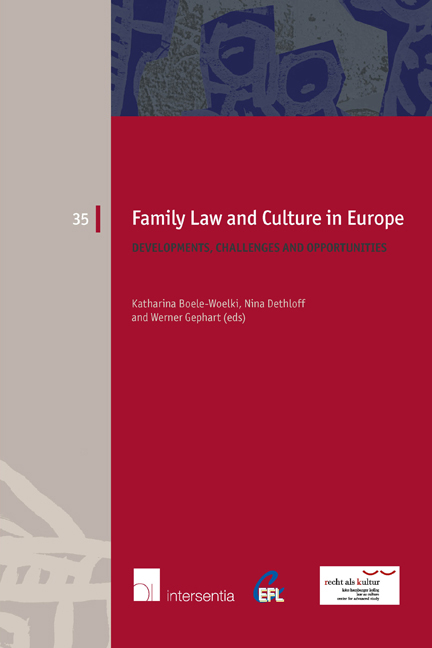Book contents
- Frontmatter
- Preface
- Contents
- List of Authors
- PART ONE THE CEFL PRINCIPLES ON PROPERTY RELATIONS BETWEEN SPOUSES
- PART TWO BREAKUP OF (NON-)FORMALISED RELATIONSHIPS
- PART THREE NEW CONCEPTS OF PARENTAGE
- PART FOUR INTERNATIONAL FAMILY RELATIONSHIPS
- The Proposal for a Regulation on Matrimonial Property: A Critique of the Proposed Rule on the Immutability of the Applicable Law
- ‘Habitual Residence’ in European Family Law: The Diversity, Coherence and Transparency of a Challenging Notion
- New Approaches to Same-Sex Marriage: The End of Nationality as a Connecting Factor?
- Protection Orders across Europe: First Remarks on Regulation No. 606/2013
- PART FIVE TRANSNATIONAL FAMILIES: ACROSS NATIONS AND CULTURES
- EUROPEAN FAMILY LAW SERIES
‘Habitual Residence’ in European Family Law: The Diversity, Coherence and Transparency of a Challenging Notion
from PART FOUR - INTERNATIONAL FAMILY RELATIONSHIPS
Published online by Cambridge University Press: 22 November 2017
- Frontmatter
- Preface
- Contents
- List of Authors
- PART ONE THE CEFL PRINCIPLES ON PROPERTY RELATIONS BETWEEN SPOUSES
- PART TWO BREAKUP OF (NON-)FORMALISED RELATIONSHIPS
- PART THREE NEW CONCEPTS OF PARENTAGE
- PART FOUR INTERNATIONAL FAMILY RELATIONSHIPS
- The Proposal for a Regulation on Matrimonial Property: A Critique of the Proposed Rule on the Immutability of the Applicable Law
- ‘Habitual Residence’ in European Family Law: The Diversity, Coherence and Transparency of a Challenging Notion
- New Approaches to Same-Sex Marriage: The End of Nationality as a Connecting Factor?
- Protection Orders across Europe: First Remarks on Regulation No. 606/2013
- PART FIVE TRANSNATIONAL FAMILIES: ACROSS NATIONS AND CULTURES
- EUROPEAN FAMILY LAW SERIES
Summary
INTRODUCTION
Habitual residence has long been a well-established criterion in private international and international procedural law. But recently, its use in legislative acts in the field of European family law has strongly multiplied and diversified, thus creating new challenges when applying the concept of habitual residence. The following observations provide a little guidance in handling the habitual residence concept in its new leading role.
UBIQUITY OF THE HABITUAL RESIDENCE CONCEPT IN MODERN EUROPEAN FAMILY LAW ACTS
Habitual residence is the predominant or at least a very important criterion in a large number of European family law acts – the Brussels II bis Regulation, the Rome III Regulation, the Maintenance Regulation, the Hague Protocol on Maintenance 2007 and the Draft Marital Property Regulations. It is thus the guiding principle both in jurisdiction and in applicable law in divorce, maintenance and (will probably in the future be in) matrimonial property: for jurisdiction in divorce matters see Art. 3 para. 1(a) nos. 1–6 Brussels II bis Reg., for the applicable law in divorce matters see Art. 5 para. 1(a) and (b) as well as Art. 8(a) and (b) Rome III Reg. For jurisdiction in maintenance matters see Art. 3(a) and (b) as well as Art. 4 para. 1(a) and (c) no. ii Maintenance Reg., for the applicable law see Arts. 3, 4 para. 3, Arts. 5 and 8(b) Hague Protocol 2007. For jurisdiction in matrimonial property see Art. 3 Draft Marital Property Reg. in conjunction with Art. 4 Succession Reg., Art. 4 Draft Marital Property Reg. in conjunction with Art. 3(a) Brussels II bis Reg., Art. 5 para. 1(a) to (c) Draft Property Reg. and for the applicable law Art. 16(a) and (b), Art. 17 para. 1(a) as well as Art. 18(a) Draft Property Reg.
This tendency is very strong in, but is not restricted to, family law. The situation is similar in the Succession Regulation – see especially Art. 4, Art. 13 for jurisdiction and Art. 21 para. 1, Art. 24 para. 1, Art. 25 paras.
- Type
- Chapter
- Information
- Family Law and Culture in EuropeDevelopments, Challenges and Opportunities, pp. 249 - 262Publisher: IntersentiaPrint publication year: 2014



